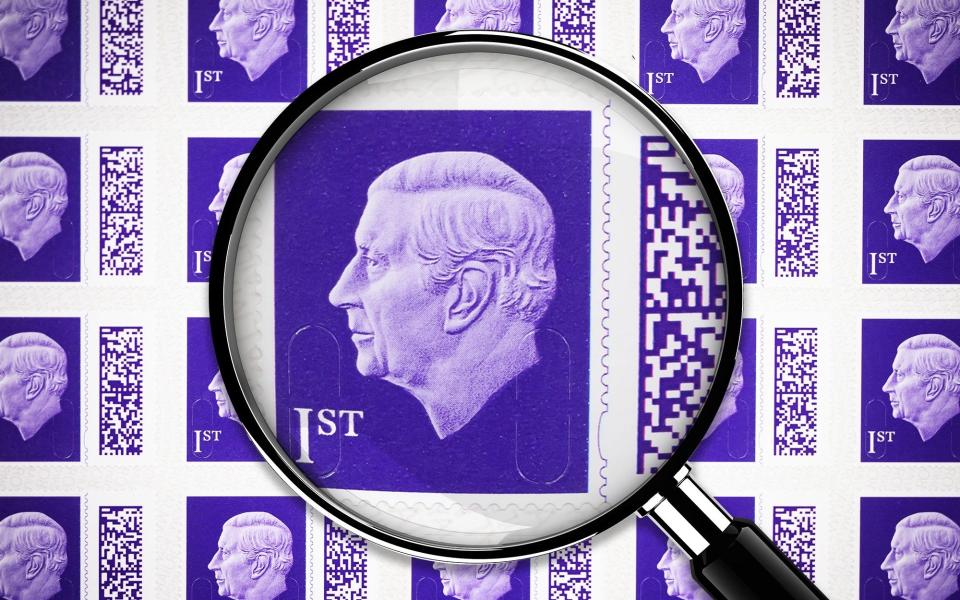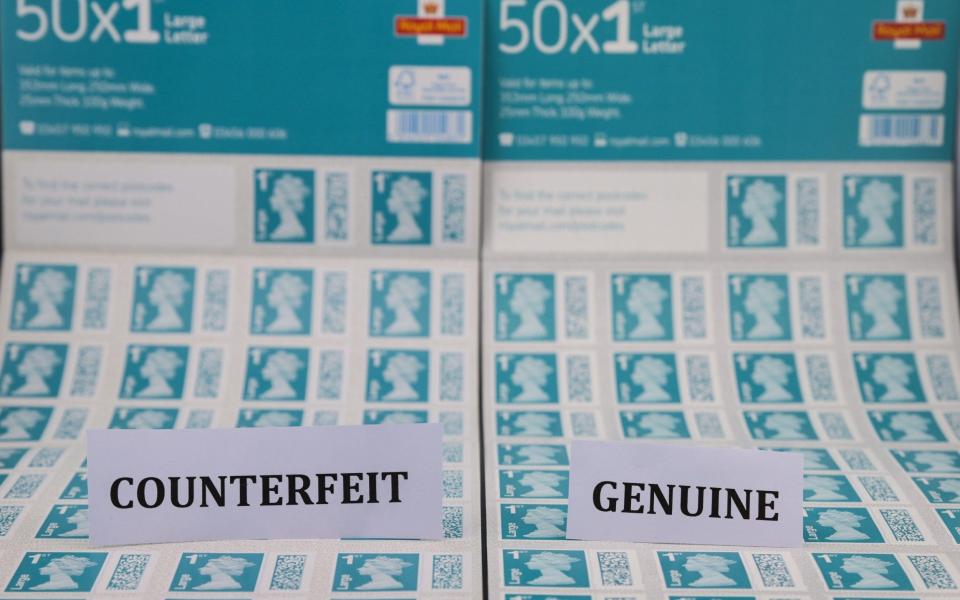Royal Mail investigating barcode stamps after customers hit with £5 fines

Royal Mail is investigating problems with new barcoded stamps amid fears customers are wrongly being fined to receive letters, The Telegraph can reveal.
Members of the public have complained that they are being hit with £5 penalties to collect post because Royal Mail has deemed the stamps on them to be counterfeit.
The issue has emerged since the postal service switched entirely to a new barcoded system in July.
Postmasters have said that the allegedly fake stamps were bought from Royal Mail directly, prompting fears that they are wrongly being identified as counterfeit.
Following a meeting on Tuesday between the Post Office minister Kevin Hollinrake and Royal Mail chief executive Martin Seidenberg, the postal service committed to investigating the issue.
The Telegraph understands that a formal investigation has not been launched, but that Royal Mail has assured the minister it is working with retailers including the Post Office to identify the “source of the problem”.
Mr Hollinrake said: “We spoke to Royal Mail and they are investigating and they are working alongside the Post Office and other retailers to try and ascertain the source of the problem.”
Last week, Royal Mail insisted its processes are “secure” and that it uses “specialist equipment” to assess whether a stamp is genuine. Most stamps are verified using the service’s scanning devices at sorting offices nationwide.
The Post Office said any allegation that fake stamps were bought at one of its branches was “extremely serious” as it implied that a postmaster or member of staff had swapped genuine Royal Mail stamps with counterfeits.
The news that Royal Mail is investigating has been welcomed by postmasters. The chair of one campaign group, which represents those wrongly convicted during the Horizon IT scandal, said: “It goes without saying that postmasters do not want to have to deal with false accusations about something else.”
It comes after more than 900 sub-postmasters were prosecuted for theft from the Post Office because of errors linked to the Horizon computer system.
Barcoded stamps were first introduced in February 2022 as a method to reduce postal fraud, saving the beleaguered company “tens of millions” of pounds each year.

Previously traditional stamps were delivered to a sorting office where they were stamped with ink to show they had been used. However the Post Office claims fraudsters were able to wash away the postmark ink and resale used stamps.
David Gold, the head of public affairs and policy at Royal Mail, said at the time “the improvements in efficiency and security” would benefit all customers.
However, since 2022, 700 managers have been fired and last year the company made a loss of £419m, a fall largely blamed on the decline in letter sending. Around 19 million letters are sent each day.
Barcoded stamps became mandatory from July 31 last year and it wasn’t long before numerous customers began complaining about being accused of having used counterfeit stamps.
It came to a head last December when a barrage of complaints emerged as people’s Christmas cards were either left undelivered or could only be collected if the recipient paid a £5 fine.
Alan Green, of Moreton-in-Marsh in Gloucestershire, was forced to pay £5 after receiving a Christmas card with a “perfectly normal-looking first-class stamp”.
The £5 bill was four times the cost of a first class stamp at the time.
Mr Hollinrake vowed to “get to the bottom of what has happened” last week when approached by The Telegraph and on Tuesday he welcomed the steps taken by Royal Mail.
He said: “I very much welcome the decision, it’s something I wanted to see and I’m pleased it’s happening.”
The minister refused to answer whether Royal Mail will also scrutinise its scanning technology used to read the barcodes – which some fear is the cause of the problem.
Robert Kennedy, an IT engineer from Lisburn, Northern Ireland, said he purchased a book of stamps in December last year from his local Post Office but only two of them were flagged as being counterfeit and the rest were not reported as being fraudulent.
He said he had such little faith in the postal service, he refused to raise a complaint. “I didn’t register a complaint because it’s such a joke. My biggest bugbear is that we trust this organisation. If they can’t get the verification of their own product right, which they produce, then how are they ever going to substantiate my claim?”
“It’s just a joke of a set up,” he added.
Mr Hollinrake said he was keeping an open mind as to whether the fault lay with Royal Mail or postmasters.
He said: “I don’t think it’s right to make accusations without evidence. I haven’t got any evidence [of postmasters selling counterfeit stamps] so that’s why you investigate these cases to see where the truth lies, but of course anyone who is guilty of anything should be dealt with properly.”
Richard Trinder, who runs the 900-member strong campaign group Voice of The Postmaster, said he and colleagues “absolutely welcome” any investigation into counterfeit stamps.
Mr Trinder, 63, who runs a branch in Sheffield said: “We have seen some postmasters posting on forums about this year.
“In our branch, we have had two or three customers coming in and saying they have been fined for these stamps and I’ve heard of around 10 or 20 others (postmasters) who’ve had similar experiences.
Mr Trinder said his stamps are delivered directly from Royal Mail offices in Swindon.
He added: “We would all absolutely welcome any investigation into this.”
The Post Office said it receives stamps directly from Royal Mail’s secure printers. They are then delivered to its warehouse before individual Post Offices receive the stamps in specialist delivery vans which also carry cash to the branch.
A spokesman said: “Any allegation that fake stamps have been purchased at a Post Office are extremely serious. The implication of such an allegation is that one of our postmasters, or a member of their staff, has obtained fake stamps and has chosen to sell them to customers rather than selling legitimate stamps that have come from Royal Mail’s secure printers.
“This is why we insist that any customer who thinks they may have purchased a fake stamp from a Post Office must produce an itemised receipt so that this can be looked into further.”
A Royal Mail spokesman said: “When a customer reports to us that they bought a stamp from a retailer that is subsequently found to be counterfeit, we will always look into the circumstances of that case.
“We also work closely with retailers and law enforcement agencies, and actively seek the prosecution of those who produce counterfeit stamps. We reaffirmed that policy to the minister today.”

 Yahoo Finance
Yahoo Finance 